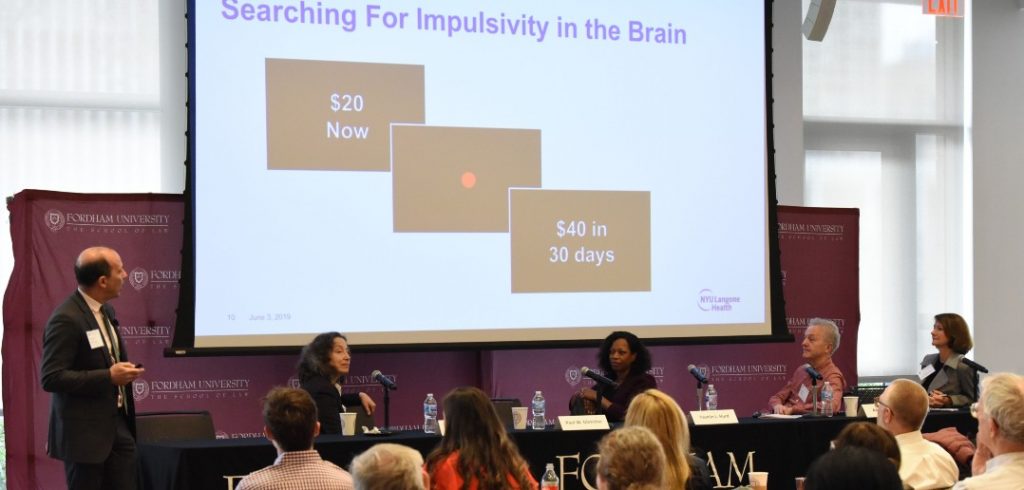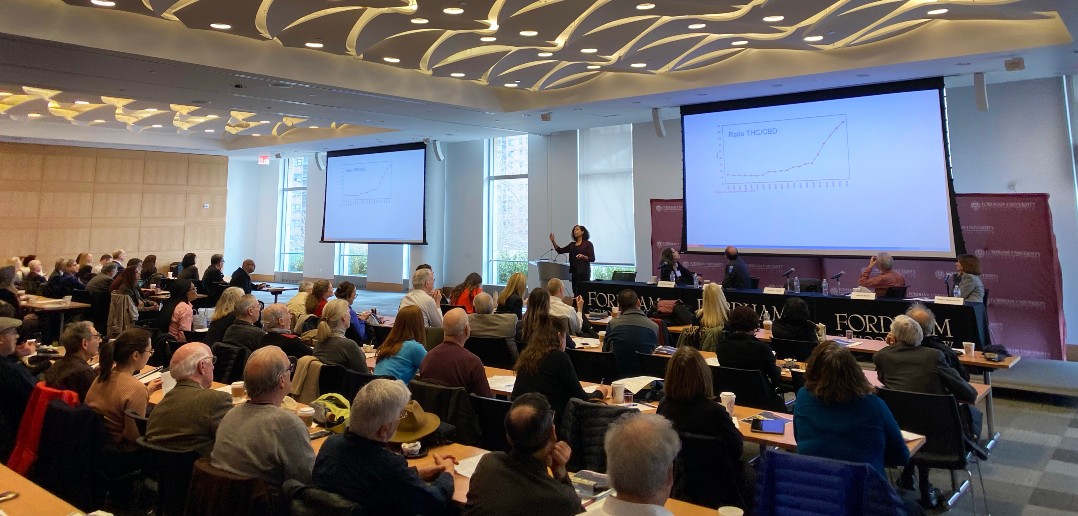Can brain implants prevent seizures? Why does poverty affect cognition? What are the methods for measuring implicit racial bias? And, just as significantly, how does such advanced research relate to the legal system? These are some of the questions that neuroscientists and neuropsychologists sought to answer at a symposium, “Cutting-Edge Developments in Neuroscience and Law,” held at Fordham Law School on February 25.
Over the last 30 years, there has been a surge in neuroscientific productivity, offering previously inconceivable insights into brain structures and brain damage. “Between 2009 and 2013, 1.79 million articles were published related to the fields of brain and neuroscientific research, amounting to roughly 16 percent of the world’s output,” said Professor Deborah Denno, the symposium’s organizer and founding director of Fordham’s Neuroscience and Law Center. “This research has been hugely influential across many different types of scientific disciplines, as well as had a significant impact on the law and in courtrooms.”

During his opening remarks, Dean Matthew Diller highlighted how neuroscience touches on a vast array of legal areas, from governmental regulation of new neurotechnology to immigration law, including evidence of brain damage and emotional trauma among asylum seekers. In the area of environmental law, Diller cited the impact of toxins on the brain and behavior. Furthermore, he noted the intersection of neuroscience with more traditional legal disciplines such as tort law (including cases involving brain injury, medical malpractice, and mass torts); elder law, wills, trusts and estates (all of which involve new research on aging, dementia; and the law) in addition to insurance law and the division between mental and physical injuries. Diller also remarked how this research can shed light on how judges and jurors make decisions and the role that bias can play throughout the entire legal system.
Over the course of four panels, presenters spoke about current neuroscientific research ranging from the latest studies in Alzheimer’s cases to innovations in epilepsy surgery and even artificial intelligence in robotics.
The first panel, titled “Ethics and the Brain: How Environment Affects Behavior and Brain Development,” explored how different environmental factors, such as poverty, incarceration, and fetal exposure to THC or CBD can have potentially negative effects on the brain. These include damaging impacts on mental health, susceptibility to delinquency and depression as well as increased anxiety, impulsivity and even recidivism. Dr. Yasmine Hurd, Director of the Addiction Institute at Mount Sinai, spoke about what she described as “the perfect storm of the developing brain” concerning the usage of cannabis and THC during pregnancy and adolescence. She explored how this might have detrimental long-term effects on the brain and decision making, which could, in turn, influence those who might later be encountering the criminal justice system.

The second panel, titled “The Future of Neuroscience and Its Moral and Ethical Implications,” focused on moral aspects of the study of neuroscience. Panelists weighed the consequences of unethical studies, which can result in phenomena like racial bias. Elizabeth Phelps, Pershing Square Professor of Human Neuroscience at Harvard University, discussed her work measuring racial bias, remarking that “implicit race bias is linked to decisions to trust and decisions about the cause of (negative) behaviors, both important judgments in legal contexts.”
The third panel, titled “The Ethics of Trauma, Aging and Brain Irregularities,” concentrated on issues such as the ethical implications of Alzheimer’s research, brain circuit implantation in individuals with depression, and the effect of hormones on the brain and behavior. Adam M. Brickman, professor of neuropsychology at Columbia University, emphasized the ethical implications of current diagnostic models for Alzheimer’s, which at present “insufficiently account for the realities of the disease.” He explained to the audience that Alzheimer’s can now be diagnosed whether or not a patient has symptoms, which he described as a radical departure of where such research existed historically.
The fourth and final panel, titled “The Law and Ethics of Neuroscientific Development,” examined a wide range of subjects spanning the impact of abusive head trauma in infants and young children to the use of novel neuroscientific and scientific evidence in courtrooms (as well as mental health treatment in juvenile detention). While panelist Judge Jed Rakoff, of the United States District Court for the Southern District of New York, contended that neuroscience does not yet have a place in courtrooms, another panelist, Dr. Ingrid Walker-Descartes, director of the pediatric residency program and director of the Center for Vulnerable Children at Maimonides Medical Center, provided a counter-argument. “When professional medical societies provide evidence-based consensus statements this will help courts, the news media, and the public to update their current state of knowledge,” said Dr. Walker-Descartes.
Professor Denno remarked that one of the symposium’s goals was to “suggest ways in which the legal system can change—either quickly by accommodating our new understanding of the human mind into current practice, or more fundamentally by incorporating this understanding into long-term modifications of legal doctrine.” She stated that this, in turn, will hopefully help to produce “a more fair and effective legal system.” It’s a sentiment that was reinforced throughout the day as panelists demonstrated how impactful neuroscience can be not only in the law but in every facet of society.


